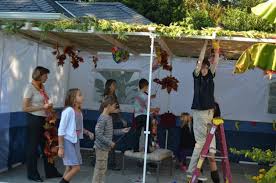
I have shared during my posts on Catholic Moment in the past that my wife, Elise, is Jewish. When we began dating in veterinary school, it did not take long for me to be hooked on her. Marrying her was the best decision of my life. Don’t get me wrong, marrying a non-Catholic has not been without its challenges (and I have brought these up in previous posts….and thank you all for serving as my online spiritual counselors BTW). However, life with her, and her family, has enriched my life and my faith greatly. Today’s reading from Exodus is a prime example of how an understanding of Jewish history has given enlightenment to my Christianity.
The first reading starts off describing how the Israelites left Ramses as Pharaoh decided, after the death of his first born son, that it was time for them to go. In fact the Egyptians so much wanted them out of there that they gave the fleeing Hebrews gold, silver and clothing. If you read in Exodus 26:14 the Israelites covered the tabernacle with, get this, DOLPHIN SKINS!!. Where did they get these? Some say that the Egyptians gave these valued skins to the Israelites as they were leaving town. Others say they may have gotten them as they journeyed along what is now the Suez Canal.
But where did the Israelites first stop after leaving Ramses? Succoth. Why Succoth? It was here that the community picked up the Hebrew slaves working in the Egyptian mines. And it was also here that they constructed their first shelters after heading out into the wilderness. They were tents or booths.
Where in the New Testament do we hear about booths? Right out of the mouth of Peter during the transfiguration of Jesus (Matthew Chapter 17). Peter is so awe struck by what he sees that he declares to Jesus that they should build three booths. One for Jesus, one for Moses(representing the law) and one for Elijah (representing the prophets). But where did Peter pull that out from? Why booths?
Because of the celebration of the festival of Succoth (or Sukkot). Not to say that the transfiguration occurred during this Jewish festival. But Peter is referring to the construction of shelters, reminiscent of the ones built by the Israelites in the wilderness. Sukkot is celebrated each year in the fall as a celebration of the end of the harvest and of the flight from Egypt.
It is in fact one of three festivals that would have caused the Hebrews to migrate to Jerusalem during the time of Jesus. We are all familiar with Passover and the feast of unleavened bread which celebrates the leaving\ of the Israelites from Egypt, the sacrifice of lambs (eating roasted meat and putting its blood on the doorposts to ward off the angel of death) and the eating of unleavened bread. It is during Passover that many feel Christ celebrated the Last Supper and leads to us thinking of him as the final sacrifice as the Paschal Lamb.
The second festival that mandated a pilgrimage to Jerusalem is Shavuot, or Pentecost. It is Pentecost because it was celebrated 50 days after Passover and commemorates the giving of the law to Moses on Mount Sinai. It was during this festival that the Holy Spirit descended upon the apostles. Pentecost was a Jewish holiday before it was a Christian celebration.
And then there is Sukkot. For me, particularly because of my exposure to Jewish celebrations, it solidifies that our ancestors.. ALL our ancestors…were Jewish. We worship the God of Abraham, Isaac and Jacob. Many of our feast days and traditions come from Jewish history. Much of the mass originates from Jewish ritual. So what happened? Why the division?
I look at the Gospel from today and the reading, in fact most of chapter 12, shows Jesus breaking the laws of the Sabbath. In fact, it looks like Jesus goes out of his way to test the law to its limits as we saw in earlier reading where he picks grain and heals the man with the withered hand on the Sabbath. And it drives the Pharisees out of their collective minds. Their focus is not on the good that Jesus does but on the fact that he broke the rules. It are these rules that they worshiped. Not the Father. Not the Son. But the set of commands made centuries ago for a people wandering in the desert. The celebrations are nice. Eating a Passover meal, building a sukkah (a tent like structure covered with branches and produce), getting dressed for Purim and spinning the dreidel on Hanukkah. And there are all the dietary laws that held significance when in the desert.
But these became their gods and they forgot The God of their ancestors. Jesus came as the Lord of the Sabbath, and of Sukkot, and Passover. He points to the Father. Does that mean that Jews of today who have a relationship with the Father are fulfilling the mission of Jesus? Can the grace of the Father be washing over those who do not profess Christ with their mouths but still experience the Spirit of the Father and the risen Son? I guess only God really knows the answer to that question. How about we go sit under the Sukkah this fall and discuss it?
